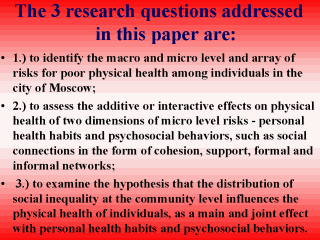 |
A context of
relative social inequality experienced by people living in different communities in
conjunction with poor habits or social connectivity can have an additive effect on
physical health. The effects of social context on individual health may be mediated by
intervening psychosocial processes which depend on the characteristics of the social
context (Hox, 1998). Social inequality can also affect health by moderating some forms of
psychosocial behaviors, such as lack of social cohesion, social support or social
networks. The lack of social connectivity may be enhanced by conditions of relative social
inequality, and thus compound its adverse effect on health. Two statistical models are
employed to explore these research questions: logistic regression at the individual level
and multilevel or hierarchical linear regression which includes both individual and
ecological factors. |
